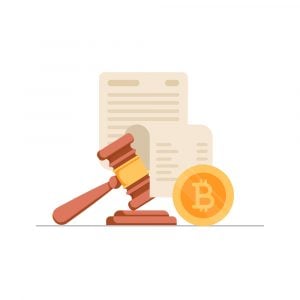An often overlooked hurdle in the formulation of legislative apparatus for cryptocurrency is the challenge of adapting cryptocurrency to the classifications and language of financial regulations.
Also Read: Research Paper Declares Bitcoin Compliant With Shariah Law
Language Barrier Between Regulators and Crypto Community
 A recent article authored by Jonathan Chester, the chief executive officer of Bitwage, featured commentary discussing the hurdles posed by attempting to conform cryptocurrency to existing regulatory language and classifications from individuals experienced with cryptocurrency law.
A recent article authored by Jonathan Chester, the chief executive officer of Bitwage, featured commentary discussing the hurdles posed by attempting to conform cryptocurrency to existing regulatory language and classifications from individuals experienced with cryptocurrency law.
Juan Llanos, the fintech and regtech lead at Consensys, alluded to the gap in the perceptual understanding of key terms between members of cryptocurrency community and the regulators tasked with overseeing the virtual currency markets.
Mr. Llanos stated “At this point in time, all token distinctions and definitions come from the emerging crypto industry, not regulators. In the eyes of regulators, there are no clear-cut token definitions, only ‘activities’ and ‘products’ regulated under existing law. That is to say, several regulators are claiming jurisdiction over crypto assets inasmuch as these emerging assets fit their subject matter focus.”
As a consequence of unique ways in which cryptocurrency phenomena sit within the regulatory purview of individual regulatory agencies, fundamental definitions pertinent to cryptocurrency often differ greatly between different governing institutions. “Some regulatory agencies have defined ‘virtual currencies’ as ‘monetary equivalents’ for purposes of money transmission and anti-money laundering; others have defined them as digital goods tradable in markets for purposes of ‘commodities’ regulation, yet others have defined them as ‘property’ for taxation purposes,” said Mr. Llanos.
Conforming Crypto to Language of Securities Law
 Thus far, Mr. Llanos asserts that “the default position of securities regulators seems to be to consider them securities or investment contracts when they fit the conditions of the Howie test.” In response, Mr. Llanos argues that the cryptocurrency industry “has been relatively successful in explaining the fundamental differences between virtual/cryptocurrencies on one hand, and protocol, investment or application tokens on the other, depending on the rights they grant, the layer of technology where they reside, and the value or utility they provide.” Mr. Llanos states that the dialogue has seen utility tokens increasing described as “consumer tokens, when the value they provide is predominantly consumptive, rather than speculative.”
Thus far, Mr. Llanos asserts that “the default position of securities regulators seems to be to consider them securities or investment contracts when they fit the conditions of the Howie test.” In response, Mr. Llanos argues that the cryptocurrency industry “has been relatively successful in explaining the fundamental differences between virtual/cryptocurrencies on one hand, and protocol, investment or application tokens on the other, depending on the rights they grant, the layer of technology where they reside, and the value or utility they provide.” Mr. Llanos states that the dialogue has seen utility tokens increasing described as “consumer tokens, when the value they provide is predominantly consumptive, rather than speculative.”
Mr. Llanos concluded that “There is today a global legal vacuum with respect to certain tokens that have a strong utility and consumptive value because they don’t fully fit the definition of ‘investment contract’ under Howie or its international equivalents,” adding that “the challenge for both regulators and entrepreneurs is that some of the digital cryptographically protected units of value known as tokens that are emerging have a dual nature: they’re both consumptive because they grant access to a technology service, for example, and at the same time provide an investment opportunity for purchasers.”
Swiss Regulators Excessively Focus on AML Considerations
 Thomas Linder, the lead blockchain partner at Swiss law firm, MME, discussed the regulatory apparatus for cryptocurrencies in Switzerland.
Thomas Linder, the lead blockchain partner at Swiss law firm, MME, discussed the regulatory apparatus for cryptocurrencies in Switzerland.
The Swiss Financial Market Supervisory Authority recently published regulatory guidelines pertaining to initial coin offerings in which tokens were classified as falling into one of three categories: payment tokens, utility tokens, and asset tokens.
Mr. Thomas describes the categories as reductive, stating that “Oftentimes projects fall into two or even all three categories,” in addition to alluding to “hybrid” tokens that do not fit neatly within the parameters of the three juridical classifications. Mr. Thomas also stated that “It seems like the regulatory authority is trying to stretch the law so that everyone is in the [anti-money laundering] bucket.”
Reports of Bitcoin Bans Often Conflated
 Over the years, numerous governments have been reported to have banned bitcoin. On occasion, reports purporting bitcoin’s illegality within a specific jurisdiction ignore the nuances of regulatory language in favor of clickbaity proclaim.
Over the years, numerous governments have been reported to have banned bitcoin. On occasion, reports purporting bitcoin’s illegality within a specific jurisdiction ignore the nuances of regulatory language in favor of clickbaity proclaim.
In January 2017, the Central Bank of Nigeria (CBN) published a circular cautioning banks and financial institutions not to transact in bitcoin and other cryptocurrencies. Following widespread claims that the CBN had banned bitcoin, the deputy director of the CBN’s banking and payments system, Musa Itopa-Jimoh, later clarified that the CBN was “just issuing caution to Nigerians.” The deputy director stated that “A lot of people misinterpreted it that we wanted to stop bitcoin. We can’t stop bitcoin […] Central bank cannot control or regulate bitcoin […] just the same way no one is going to control or regulate the internet.”
How do you feel that we can bridge the gap between the language of financial regulation and the language of the cryptocurrency community? Share your thoughts in the comments section below!
Images courtesy of Shutterstock
Want to create your own secure cold storage paper wallet? Check our tools section.
The post The Challenge of Conforming Crypto to the Language of Regulation – or Vice Versa appeared first on Bitcoin News.
Powered by WPeMatico

